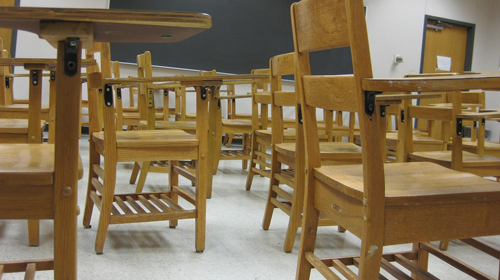
Year after year, PDK/Gallup releases an annual poll of public attitudes toward public schools, and it consistently finds that a majority of those polled oppose allowing students and parents to use taxpayer-funded vouchers to attend private schools. This year's poll, released today, found that 70 percent of Americans oppose funneling taxpayer dollars to private schools for tuition, the highest level of opposition to vouchers ever recorded.
We've long advocated against taxpayer funds being used for private and religious school. Here's why.
Vouchers harm religious liberty. Religious schools, which receive the overwhelming majority of taxpayer-funded vouchers, not only require all students to receive religious instruction and attend religious services, but also integrate their religious beliefs in everything they teach students (just one alarming example: a science textbook, in order to support creationist beliefs, claims the Loch Ness Monster is a living, breathing dinosaur). Thomas Jefferson and James Madison knew it was wrong to use taxpayer money—even three pence—to support religious education, because doing so amounts to government promotion of religion and requires all taxpayers to fund religious indoctrination. They wrote the Virginia Statute for Religious Freedom and the first freedom of our First Amendment to protect against just that. Right now, we are fighting to protect religious liberty and stop voucher programs with cases in Colorado and New Hampshire.
Beyond harming religious liberty, vouchers lead to taxpayer-funded discrimination. For instance, a voucher program in Milwaukee systematically excludes students with disabilities from participating and segregates them in public schools in disproportionate numbers. Yet, the government can't fund or aid discrimination. Based on a complaint we filed, the Department of Justice affirmed this principle and thus, the Milwaukee voucher program must abide by the Americans with Disabilities Act, which prohibits discrimination in publicly funded and administered programs on the basis of disability. We are also investigating how voucher programs increase racial segregation in schools and believe, unfortunately, we will find the same sorts of problems.
In addition, many religious schools that receive taxpayer-funded vouchers discriminate in hiring and admissions. For example, in Georgia, more than 100 schools that discriminate against LGBT students are eligible for taxpayer funds.
There are myriad other reasons why taxpayer-funded vouchers are bad policy: They don't improve academic outcomes; there are frequent stories of fraud and abuse and no quality control; they lead to increased property taxes; and on and on. These arguments haven't stopped legislators in statehouses or Congress from trying to enact vouchers and privatize public education. Close to twenty states have some sort of voucher program and every year in states across the country, we work to defeat vouchers, tax-code shell games, expansions of existing programs, and proposals to weaken religious liberty safeguards in state constitutions—all aimed at diverting taxpayer funds to private and religious schools. This year, two states, Alabama and South Carolina, enacted new programs. And, congressional leaders want to create a national voucher scheme as the centerpiece of education reform legislation—something we and the National Coalition for Public Education fight. Congress hasn't found enough support to do this yet, but of course, continues funding the voucher program it created as an experiment for Washington, D.C.
Lawmakers are willing to ignore serious policy arguments and legal consequences, but let's hope they won't ignore the overwhelming majority of the public who oppose taxpayer-funded vouchers. Enough is enough.
Learn more about school vouchers and other civil liberty issues: Sign up for breaking news alerts, follow us on Twitter, and like us on Facebook.

